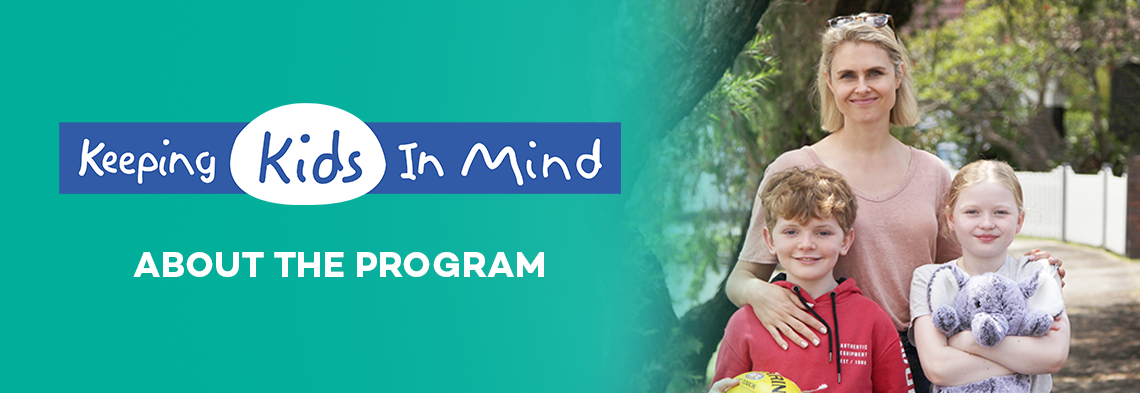Keeping Kids in Mind | About Us
About Us
Keeping Kids in Mind (KKIM) is a program for separated parents where there is a medium to high level of ongoing conflict. The program was developed through a collaboration between CatholicCare Sydney, CatholicCare Wollongong, Centacare Broken Bay and CatholicCare Parramatta by a multi-disciplinary team of Group Educators, Mediators and Counsellors.
The initial concept of KKIM developed from the Family Law Court and the Federal Magistrates Court of Australia’s need for post-separation parenting programs and referral pathways for high-conflict separated couples with children. It was felt that parents would benefit from a greater understanding of the impact of their conflict on their children’s social and psychological development.
The Commonwealth Family Law Amendment (Shared Parental Responsibility) Act 2006, represents a move by the Australian Government to focus more on children’s wellbeing during the post-separation period and reflects increasing research which indicates that better long-term outcomes can be achieved through children’s healthy and positive adjustment to their new family situation (Bacon & McKenzie, 2004; McIntosh & Deacon-Wood, 2003).
The move to place greater emphasis on the wellbeing of children during the process of separation and divorce through improvements in processes and support services for parents and families is also recognition of the paradoxes that exist during the emotional turmoil of separation and divorce; namely, that the emotional upheaval and trauma experienced by adults during separation and divorce severely limits their ability to support their children at the precise time that children need the emotional support and reassurance of their parents (McIntosh & Deacon-Wood, 2003; Moloney & Smyth, 2004).
While most couples will experience some level of conflict in the post-separation period there is also increasing acknowledgement at legislative, research and community levels of the need to prevent post-separation conflict becoming entrenched. Unfortunately, it is entrenched conflict that most often results in decreased contact with one parent. This is particularly important as research indicates the value and importance of the equal involvement of both parents in a child’s life and of both parents remaining involved in their child’s life following separation (Moloney & Smyth, 2004; Parkinson, 2006; Smyth & Moloney, 2008).
Post-separation education programs can help parents understand the effects of their conflict on their children, increase parent knowledge about how to be a co-parent, and encourage parents to communicate and problem-solve between each other, all of which will reduce the exposure of children to parental conflict (K. M. Kramer, Arbuthnot, Gordon, Rousis, & Hoza, 1998). It is believed that highly conflicted parents can still enter into a successful co-parenting relationship, somewhat like a business relationship (Shifflett & Cummings, 1999).
McIntosh and Deacon-Wood (2003) have studied the differences between those parents who attended a post-separation education program and those who did not. They found that parents who attended a program:
- showed better understanding of the effects of divorce on their children
- could recognise the signs of distress within their children
- were more likely to give adequate support to their children
- were more confident in their decision making over a six-month period
- increased the amount of regular contact that parent had with their child (McIntosh & Deacon-Wood, 2003).
There is also the potential for positive indirect and even cumulative improvements in children’s lives to flow from post-separation programs, but the nature of such positive effects remains under-researched.
Evaluation
A mixed-method evaluation was undertaken by the Family Action Centre, University of Newcastle in 2010. Staff from the four agencies participated in two focus groups to explore the effectiveness and impact of the KKIM group-work program. A survey for parent participants in the KKIM group-work program regarding the effectiveness and impact of the program on their lives and those of their children was distributed through the three agencies that had implemented the KKIM program. Parents were also invited to participate in telephone interviews with an evaluator. The return rate of surveys was 19.27% (n = 22), and from this return group, 11 parents were interviewed. Quantitative data were analysed using Microsoft Excel software and qualitative data were analysed using NVivo 8 software. Survey answers and interviews were broken into broad themes associated with behaviour, knowledge and attitudes, as well as useful content and improvements related to the group-work program.
The results from both the staff focus groups and the parent surveys were consistent in their identification of the areas in which the KKIM group-work program had a positive impact on parents and children. The majority of parents either “Strongly Agreed” or “Agreed” that KKIM had:
- improved their knowledge of the impact that separation and divorce has on children
- helped them learn to manage their own emotions better
- helped them learn to value the contribution of the other parent
- benefitted from improved parenting strategies and skill development
The evaluation concluded that the content and process of the KKIM program is consistent with best practice and current research. Further, the results strongly suggest that:
- attendance at KKIM has a positive impact on parents’ abilities to manage the emotional turmoil that ensues from relationship breakdowns
- new knowledge, improved skills and change in attitudes regarding the other parent and the co-parent relationship in the post-separation period are of benefit to both parent and child.




